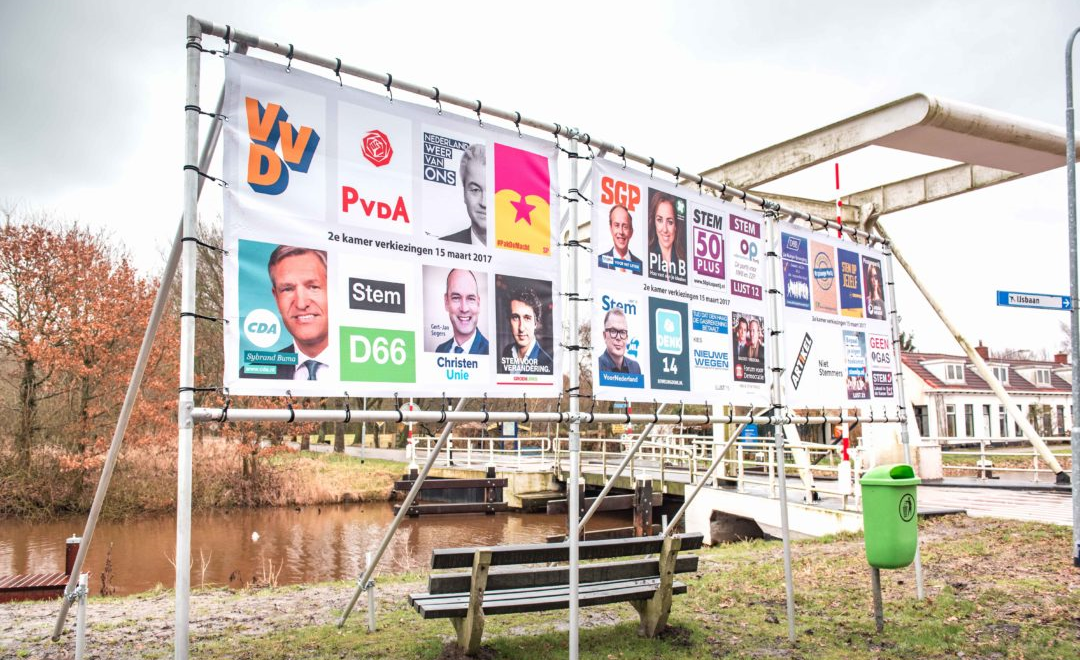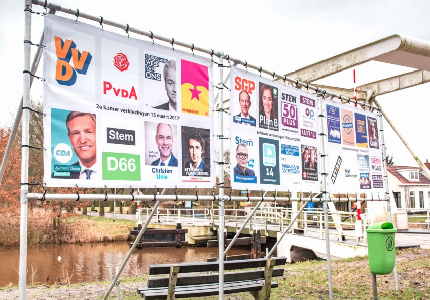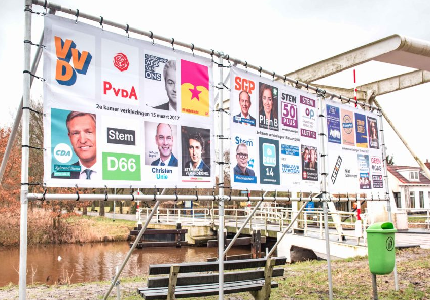With less than a week to go until the general elections in the Netherlands, many Dutch citizens are wondering what the future will hold. There are a record 28 parties on the ballot next Wednesday, 15 March, several of which have only been established in the past year.
The government that will likely be elected is a coalition of different parties across the political spectrum. While the right-wing People's Party for Freedom and Democracy (VVD) and Party for Freedom (PVV) are currently leading in the polls, the more centrist Christian Democrats (CDA) and Democrats 66 (D66) and the leftist Green-Left (Groenlinks) are following closely behind.

We asked Dutch Ambassadors what is at stake in the elections, particularly for the future of Europe, and why voting is so vital.
Arnold Meijer, 30:
"The Dutch vote is ahead of some of the other countries in Europe, for example France later this year. In this way, the Dutch vote will be an indicator showing how Europe is changing its approach to some critical world-pressing issues, and how this will influence our lives. The main issues at stake in the Netherlands are shared by many other European nations: supporting an increasing number of refugees in Europe, the changing relationship with the United States and the increasing challenges that come with a growing economy. What’s interesting to see is that the amount of parties and thereby options for voting has never been this high. This could be a positive sign as anyone with a good idea can be heard, but it’s also a sign that people have never been so divided as they are today.
As for voting, it is a right, one that’s not always given and thus should not be easily forgotten. Voting means influencing the course of a nation which will impact young people more than anyone else. That’s why you should vote, no matter how old you are."
Erin Hermsen, 29:
"I will give my vote to an inclusive party, one that doesn’t see globalisation as a risk, but rather as an opportunity. One that offers concrete answers to issues like increasing inequality and global warming. But unfortunately, despite having twenty-eight(!) parties in this election, there is not a single party that is able to convince me with concrete solutions instead of empty rhetoric. Instead, this large amount of parties is making it even more difficult to really get a grip on what every party stands for. Therefore, I am part of the seventy percent of Dutch voters that hasn’t decided yet for whom to vote. We will probably end up with many political parties to form a government, and in practice this means that this will be a government of compromises and there will indeed be limited translation of words into deeds.
Despite this rather pessimistic view, I do believe it’s really important to vote. As long as there as an active counter-movement against right-wing populism these parties will never be able to actively pursue their extreme vision - at least in the Netherlands."
Majid Himi, 28:
"My parents were welcomed with open arms when they migrated from Morocco to the Netherlands as guest workers in the 1960s. Today, however, the biggest party in the election polls is one that holds extreme right-wing views, holds Islam accountable for all the bad things that happen in the country, and reduces a large part of the population to second-class citizens.
My vote, and hopefully that of millions of others, will be one that counters this rhetoric and at the same time puts trust in a party that addresses today’s challenges with solutions based on the foundations of freedom and tolerance. People and nations worldwide take the Netherlands as an example with regards tolerance, freedom, quality of life, and human rights. Therefore it’s extremely important to continue to lead the way with forward-thinking and liberal policies. The Dutch vote will determine whether or not the Netherlands can continue to be a role model in countering some of today’s most pressing global issues."
Reinoud Clemens, 27:
"We, Dutch people, are doing well, very well actually, in terms of welfare, happiness, and development. On election day, we do not need any more messages of fear, of exclusion and of segregation, but we need messages of hope, of acceptance of those that are in need, of politicians that still dare to live by their ideals but who are able to explain that sometimes they need to be pragmatic. Because it is that same pragmatism that has created the famous Dutch 'polder-model'. An approach that includes different perspectives, from different backgrounds and different generations, to come to an agreement/consensus fit for all. The younger generation should use that 'polder-model' and make sure their perspective is also heard."
Eva van de Pol, 29:
"I would recommend everyone to go out and vote, but especially all young Dutch citizens. This is our future, our country, and our world we live in. Ask yourself, what kind of world do you want to live in? You can have a voice in that future – use it wisely. There are places in the world that won’t allow you to use your voice or share your political opinion at all, so never take that for granted. Speak now or remain silent for the coming four years.
What the Dutch people decide to vote for will be a reflection of the current sentiment not only in the country, but probably around the whole of Europe. The main issues at stake are challenges such as security, immigration and the future of the European Union. There is a lot of polarisation in the Netherlands, but I would like to see the Dutch citizens not making the same mistake as the US did. It is okay to disagree with each other, but let us not choose for hate and exclusion and instead join forces to make the Netherlands a better place for everyone to live in."
"The dominance of the right wing will play a key role in the upcoming elections. There is an ongoing discussion on how to preserve the Dutch culture in a period of increasing influences from Islam due to recent migratory flows from e.g. Syria. It is important to use your vote to show what the generation of the future wants.
I think this is not so much about 'preserving the Dutch culture' but more related to social, physical and environmental well-being in the long term. Changes that we need quickly include prevention of and preparation for climate change, cultural adaption, new models for economic growth (such as working less with stable income), reversing individualism into a new form of community thinking and sustainable food innovation to reduce meat and dairy intake and improve our health."
Lianne Elferink, 29:
"Young people should go out and vote because the elections are connected to important decisions regarding the future of our country. I like to think of the Netherlands as an open country that welcomes different cultures and supports people in need. However, acts of terrorism and the rise of populism around the world have brought up discussions on this topic that worry me. Of course this is a delicate subject and there is no clear solution, but we need to remember that refugees coming to the Netherlands are desperate and are leaving their house and country because they have no other choice, not because they want to. I think this vote is also important to show that the Netherlands is still committed to Europe and solving these problems together."


